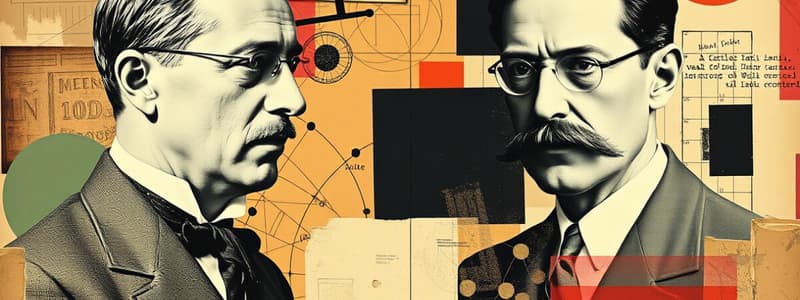Podcast
Questions and Answers
Who is associated with scientific management?
Who is associated with scientific management?
- Frederick Taylor (correct)
- Henri Fayol
- Elon Musk
- Max Weber
Who developed bureaucratic management?
Who developed bureaucratic management?
- Henri Fayol
- Henry Ford
- Frederick Taylor
- Max Weber (correct)
What are the key goals of scientific management?
What are the key goals of scientific management?
To secure maximum prosperity for employer and employee.
The key principle of scientific management is to ___ a science for each job.
The key principle of scientific management is to ___ a science for each job.
What does the motion study focus on?
What does the motion study focus on?
What is a bureaucratic organization characterized by?
What is a bureaucratic organization characterized by?
What principle dictates that a worker should receive orders from only one boss?
What principle dictates that a worker should receive orders from only one boss?
Which of the following is NOT a characteristic of ideal bureaucracy?
Which of the following is NOT a characteristic of ideal bureaucracy?
What are the administrative principles defined by Henri Fayol?
What are the administrative principles defined by Henri Fayol?
The scalar chain principle states that organizations should have clear and unbroken lines of ___ from top to bottom.
The scalar chain principle states that organizations should have clear and unbroken lines of ___ from top to bottom.
Flashcards are hidden until you start studying
Study Notes
Scientific Management
- Frederick Taylor pioneered scientific management in 1911, emphasizing efficiency and productivity.
- Observed that unclear methods reduced worker efficiency, leading to underperformance.
- Proposed a systematic approach for each job, including careful selection, training, and motivation of workers.
- Advocated for supporting workers based on scientifically developed methods.
Key Components of Scientific Management
- Develop a Science for Each Job: Analyzes tasks to identify the most efficient methods and tools.
- Hire Workers with the Right Abilities: Focuses on the selection and thorough training of the workforce.
- Train and Motivate Workers: Supervisors are trained to encourage and guide workers effectively.
- Support Workers: Supervisors ensure that employees have the necessary resources to perform their tasks successfully.
- Motion Study: Involves breaking down tasks into basic physical motions to enhance efficiency.
Examples of Scientific Management
- Implemented in organizations like UPS and the Henry Ford production line, showcasing improved productivity through systematic methods.
Bureaucratic Management
- Max Weber (1864-1920) developed bureaucratic theories in response to inefficient organizational practices, promoting a structured approach.
- Defined bureaucracy as a rational organization based on logic and legitimate authority.
Characteristics of an Ideal Bureaucracy
- Clear Division of Labor: Well-defined jobs that require high skill levels for performance.
- Clear Hierarchy of Authority: Established authority and responsibility, with a distinct reporting structure.
- Formal Rules and Procedures: Written guidelines establish expected behaviors and maintain historical records.
- Impersonality: Ensures impartial treatment with no favoritism based on personal characteristics.
- Careers Based on Merit: Workers are selected and promoted based on ability and performance, with managers as career employees.
Administrative Principles
- Henri Fayol outlined administrative principles in his publication "Administration Industrielle et Generale."
- Identified fundamental management functions: foresight/planning, organization, command, coordination, and control.
Functions of Management
- Foresight/Planning: Establishes a comprehensive future action plan.
- Organization: Allocates resources effectively to carry out plans.
- Command: Involves leading and evaluating team members.
- Coordination: Integrates efforts, shares information, and solves problems collaboratively.
- Control: Monitors progress to ensure alignment with plans and implements corrective actions as necessary.
Organizational Principles
- Scalar Chain Principle: Emphasizes clear communication lines from the top to the bottom of the organization.
- Unity of Command Principle: Ensures each employee reports to only one supervisor to avoid confusion and conflicts.
Studying That Suits You
Use AI to generate personalized quizzes and flashcards to suit your learning preferences.




